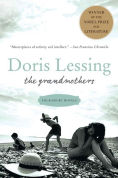My friend Jill recommended this collection of four short novels. This book was new to me, though I’ve read a number of Lessing’s books, including a reread of The Golden Notebook and Lessing’s autobiography. In these stories, as in much of her work, Lessing examines unusual relationships with a piercing honesty and deep understanding of human nature.
You won’t find a typical boy-meets-girl story here. It’s one of the things I love about her work. I’ve always objected to the idea—less prevalent these days but not gone entirely—that a woman’s only story is about love and marriage. How many movie versions of books have you seen that have been Hollywood-ized by the addition of a love interest? Even nonfiction gets distorted this way. I’m thinking of Under the Tuscan Sun, though I heard recently that there were attempts to add a love affair to the recent film about mathematician Srinivasa Ramanujan.
By going at relationships from an odd angle, Lessing brings a freshness to weary tropes and produces startling insights.
At first I thought Jill was recommending the book because of the title story, since we’d just been talking about grandparenting. Lessing’s grandmothers are two longtime close friends who live across the road from each other in a small, southern, seaside town far from England. The story follows Roz and Lily as their marriages founder, their sons Tom and Ian, and eventually the women their sons marry and their daughters. I don’t want to give away too much, but their is a quirk in this seemingly normal setup that will make you think about family interactions and what we mean to each other in ways you never have before.
The second novel, “Victoria and the Staveneys”, looks at a mother and daughter and the child’s father. It’s about dreams and talismans and the pressures of society. Each character, even the secondary characters, is so fully realized that you will find yourself inhabiting lives you never imagined.
The final novel shows us quiet Jimmy Reid from his youth, as he introduced by his outgoing friend Donald to a socialist summer school where Jimmy is “dazzled by this largesse of new ideas, faces, friends.” It follows him through World War II and beyond, but this is not a story about battles and bloodshed. It is about one person with a goal, a fantasy perhaps, and how he pursues it. I have rarely read a story so emotionally vibrant. The places and people, the events and motivations, if not what I expected, still ring so true.
As it turns out, Jill encouraged me to read the book because of the third novel, “The Reason for It”, an extraordinarily prescient look at the last days of an imagined culture. It is narrated by the last of the Twelve, appointed as Guardians of the people by Destra, a ruler already old when our narrator was born. Following the reign of her husband, a cruel tyrant, Destra initiated an age of peace and prosperity, an age of stories and songs. Destra selected twelve children to be educated in her house along with her adopted son DeRod, with the understanding that at some point they would elect among themselves a ruler and the remaining twelve would become a council.
Although it was not required, when they were fifteen, they elected DeRod as the ruler. Since then their culture has gradually dissolved.
I would like to have the time to write down the wealth of tales and stories that seem to have been lost. How could they have been lost? I have lived now for nearly a hundred years. For at least half that time the tales and songs were on everybody’s lips. And yet now only old people—my son can be described as old—remember them.
Without memories of the past, what is left is entertainment, insolence and casual violence. Festivals of songs and stories have been replaced by military festivals of army exercises and fighting. DeRod has become obsessed with a new building project, excavating an ancient city.
As in the other stories, Lessing brings these people and their culture to life. With none of his companions to turn to, the narrator sets out to understand what has happened and what, if anything, he can do about it. The first step must be to delve into DeRod’s behavior and choices and see this man clearly for the first time.
To me, the great joy and gift of reading is to inhabit other lives and experience other worlds. Lessing’s stories challenged me and changed me in subtle ways.
What fiction have you read that seems to shed light on our own time?
